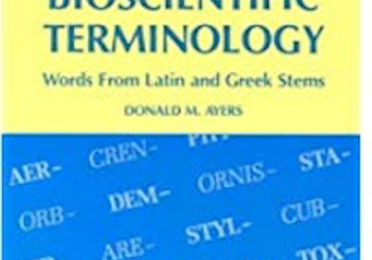- Winter 2020
Syllabus Description:
CLAS 205A — Bioscientific Vocabulary
Winter 2019, MWF 8.30-9.20, DEN 258
Instructor: Diana Molkova
Email: dmolkova@uw.edu
Mailbox: Classics Dept. Office, Denny 262
Office: Denny Hall 400K
Office Hours: MW 11.00-12.00 and by appointment
Department Phone: 2065432266
Department Course Coordinator:
Professor Alain M. Gowing
M262C Denny Hall, Department of Classics
Email: alain@u.washington.edu
Required Text:
- Donald M. Ayers, Bioscientific Terminology: Words from Latin and Greek Stems (The University of Arizona Press)
Recommended Reference Texts:
- Any reputable English dictionary with etymological entries, such as The American Heritage Dictionary (3rd ed.), or Webster’s New World Dictionary.
- Online resources:
Google dictionary (google “define + word”)
Online Etymology Dictionary (http://www.etymonline.com)
Merriam-Webster Dictionary (https://www.merriam-webster.com)
COURSE AIMS:
The primary goal of this course is to improve your understanding of technical vocabulary used in the biological sciences. You will learn to assess the meaning of words by breaking them down into component parts that derive from Latin and ancient Greek. By the end of the quarter you should be at ease in identifying rare medical or scientific terminology. No knowledge of Latin or Greek is required.
Successful completion of this class requires a great deal of memorization. Students must keep up with the assignments and review the contents of each lesson regularly.
CLASS CONDUCT:
Out of courtesy to your classmates and to me, please come to class on time and prepared to contribute.
If absence is unavoidable due to illness or other legitimate circumstance (that is, family emergency, religious or cultural obligation, court date, university-sponsored competition or field trip), please contact me via e-mail to let me know before class. If you are absent, it is your responsibility to find out what you missed in class, to catch up on any missed homework, to schedule make-ups for any quizzes or exams, and to make sure I give you any relevant points.
I answer class-related e-mails only on weekdays (M-F) during work hours (8.00-17.00). Please keep in mind that our e-mail correspondence is a public record according to RCW 42.56, the Washington State Public Records Act, and I have the right to share it with my supervisor or other authorities if I think it is necessary (more information at https://itconnect.uw.edu/work/appropriate-use/public-records-act/).
I cannot discuss grades during class or via e-mail due to university policy, but only during office hours or by appointment.
UW POLICIES:
The UW's Religious Accommodations Policy: “Washington state law requires that UW develop a policy for accommodation of student absences or significant hardship due to reasons of faith or conscience, or for organized religious activities. The UW’s policy, including more information about how to request an accommodation, is available at Religious Accommodations Policy (Links to an external site.). Accommodations must be requested within the first two weeks of this course using the Religious Accommodations Request form (Links to an external site.).”
The UW's Student Conduct Code: "The University of Washington Student Conduct Code (WAC 478-121) defines prohibited academic and behavioral conduct and describes how the University holds students accountable as they pursue their academic goals. Allegations of misconduct by students may be referred to the appropriate campus office for investigation and resolution. More information can be found online at https://www.washington.edu/studentconduct/." (Links to an external site.)
Access and Accommodation: Your experience in this class is important to me. If you have already established accommodations with Disability Resources for Students (DRS), please communicate your approved accommodations to me at your earliest convenience so we can discuss your needs in this course.
If you have not yet established services through DRS, but have a temporary health condition or permanent disability that requires accommodations (conditions include but not limited to; mental health, attention-related, learning, vision, hearing, physical or health impacts), you are welcome to contact DRS at 206-543-8924 or uwdrs@uw.edu or disability.uw.edu. (Links to an external site.)DRS offers resources and coordinates reasonable accommodations for students with disabilities and/or temporary health conditions. Reasonable accommodations are established through an interactive process between you, your instructor(s) and DRS. It is the policy and practice of the University of Washington to create inclusive and accessible learning environments consistent with federal and state law.
Academic Integrity: University of Washington students are expected to practice high standards of academic and professional honesty and integrity as outlined here: http://depts.washington.edu/grading/pdf/AcademicResponsibility.pdf
GRADING:
Homework: To help you stay on track with memorization, there are 5 homework assignments in the format of canvas quiz that consist of vocabulary items from recent reading. They are open-note, and are each worth 10 points.
Participation: Active classroom participation is important. The first step in participating in class is regularly attending. Beyond simply showing up, I expect everyone both to be prepared and to actively participate in class discussions and activities. Consistent participation in class counts for 10 points.
Tests: There will be four tests, worth 85 points each, given over the course of the quarter. The last test will be held on the day of the final (Tuesday, March 17, 8.30-9.20 in DEN 258) but is not cumulative. Make-up opportunities will only be given due to a legitimate absence, as defined above, and then only if the absent student promptly e-mails me to reschedule.
Bonus points: Bonus points will be offered on each of the tests. Even if a student has achieved the maximum score for a given quiz or final without the bonus points, any earned bonuses will be ‘banked’ for use towards the student’s overall points total for the course.
Grading breakdown:
Homework: 5 x 10 = 50 points
Tests: 4 x 85 = 340 points
Participation: 10 points
----------------------------
Total: 400 points
4.0: 400-381 3.0: 320-312 2.0: 230-221 1.0: 139-120
3.9: 380-371 2.9: 311-302 1.9: 220-211 0.9: 119-109
3.8: 370-366 2.8: 301-293 1.8: 210-201 0.8: 108-98
3.7: 365-361 2.7: 292-284 1.7: 200-191 0.7: 97-87
3.6: 360-356 2.6: 283-275 1.6: 190-181 0.0: 86 or fewer*
3.5: 355-351 2.5: 274-266 1.5: 180-171
3.4: 350-345 2.4: 265-257 1.4: 170-161
3.3: 344-337 2.3: 256-248 1.3: 160-151
3.2: 336-329 2.2: 247-239 1.2: 150-141
3.1: 328-321 2.1: 238-231 1.1: 140-131
*Note: In order to pass this class, you must receive 87 points or greater.
SCHEDULE
All readings and assignments are due on the day they are listed on the syllabus.
|
|
Monday
|
Wednesday |
Friday |
|
Week 1 (1/6-1/12) |
Introduction
|
Lesson 1 |
Lessons 2 and 3 |
|
Week 2 (1/13-1/19) |
Lessons 4 and 5
|
Lessons 6 and 7 |
Lesson 8 |
|
Week 3 (1/20-1/26) |
NO CLASS
|
Lesson 9 |
TEST 1 (1-9) |
|
Week 4 (1/27-2/2) |
Lessons 10 and 11
|
Lessons 12 and 13 |
Lesson 14 |
|
Week 5 (2/3-2/9) |
Lessons 15 and 16
|
Lessons 17 and 18 |
Lessons 19 and 20 |
|
Week 6 (2/10-2/16) |
TEST 2 (10-20)
|
Lesson 21 |
Lessons 22 and 23 |
|
Week 7 (2/17-2/23) |
NO CLASS
|
Lessons 24 and 25 |
Lesson 26 and 27
|
|
Week 8 (2/24-3/1) |
Lessons 28 and 29 |
Lesson 30 |
TEST 3 (21-30)
|
|
Week 9 (3/2-3/8) |
Lessons 31 and 32 |
Lessons 33 and 34 |
Lessons 35 and 36 |
|
Week 10 (3/9-3/15) |
Lessons 37 and 38 |
Lesson 39 |
Lesson 40 |
Final Test: Tuesday, March 17, 8.30-9.20 in DEN 258
I reserve the right to modify the syllabus.

